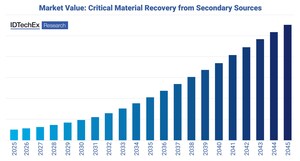BOSTON, March 28, 2023 /PRNewswire/ -- Wearable technology is threatening to disrupt aspects of the pharmaceutical industry, with the latest technology offering a drug-free alternative to health management. But which of these competing wearable technologies are the promising candidates to lead the healthcare revolution?
The growing demand for wearable therapeutics is underpinned by the appetite of consumers to take control of their health and circumvent rising costs and staff shortages within traditional healthcare. Established non-pharmaceutical pain relief technologies include heat and electrical stimulation, but more advanced solutions using light therapy and radio waves are emerging. IDTechEx's latest wearable technology market report, "Wearable Technology Forecasts 2023-2033", reveals prominent opportunities in wrist-worn technology, skin patches, and smart clothing, along with specific challenges that need to be overcome to realize widespread adoption.
Heated Clothing for Period Pain
Heat therapy is a popular non-pharmaceutical method for pain relief that can increase blood circulation and reduce inflammation. While solutions like gels and disposable patches have long been commercially available for localized pain relief, heated clothing has primarily been reserved for non-healthcare applications such as ski gloves and motorcycle jackets.
To date, relatively bulky batteries and control electronics make heated clothing unsuited for comfortable and discreet pain relief, leaving markets for menstruation, injury recovery, and professional sport untapped. Yet emerging flexible electronics technologies could overcome some existing form factor restrictions that reduce wearer comfort. For example, stretchable conductive inks can be printed directly onto fabrics, lowering production costs and increasing comfort relative to the more conventional approach of integrating wiring.
Yet despite advances in printed and flexible electronics, significant challenges remain. Rigid integrated circuits, required for battery management and heating control, must be incorporated (although this can be on a flexible substrate). Additionally, the high-power requirements for heating are beyond the capacity of flexible batteries currently available. As such, in the near term, a heating patch or clothing requires a rigid battery or wired connection to another power source, making cheaper alternatives like gels, patches, or hot water bottles more appealing for pain relief. However, as the capacity of flexible or even stretchable batteries continues to improve and stretchable electronics gains traction, e-textiles with integrated heating may offer a compelling reusable alternative.
Light Therapy Headbands for Alzheimer's
Light therapy is gaining popularity for its claimed benefits in treating hair loss and reducing aging, but research suggests it could also manage health conditions such as depression, Alzheimer's, and even Lyme disease. For example, certain infrared wavelengths are thought to increase cellular metabolism through photobiomodulation. Light therapy wristbands have already generated millions of USD in sales to the wellness market, with headbands offering transcranial light therapy, for example from Cerathrive, now looking to follow.
However, the absence of regulation and research regarding photobiomodulation creates a challenge for this sector. The clinical benefits and chemical pathways associated with light therapy remain under research, with exact pulse characteristics, power, and wear time optimal for certain conditions largely unknown. As such, despite their potential, they will likely remain limited as wellness tools rather than medical devices in the medium term.
Overall, the highest value would come from a regulatory-approved transcranial light therapy solution for neurological disorders lacking any treatment alternatives today. Moreover, while the medical potential of light therapy continues to be explored, wearable OEMs have an opportunity to continue selling into the wellness market for drug-free health management and extend it beyond just cosmetics.
Endorphin Stimulation for Fibromyalgia
One of the newest approaches to chronic pain management is a wrist-worn radio-wave (or mm-wave) emitter to stimulate endorphin release. Endorphins are considered the body's 'natural' method of managing pain. Developers of this technology, Remedee Labs, see the value in the device as a user-friendly tool to manage chronic pain and consider it to have the most promise as a medical device, unlike the wellness limitations of others.
The technological advancements to develop miniaturized, on-chip radio wave emitters are significant, requiring a bespoke ASIC alongside a GHz emitter to be manufactured on pure CMOS. The GHz frequency range is better suited to long-range patch antenna applications. As such, designing an interface that optimizes the dissipation just a few mm into the skin is non-trivial.
Fibromyalgia is a particularly compelling application for this technology, as existing pharmaceutical treatments are known to have severe side effects. Clinical trials are ongoing to demonstrate the efficacy of endorphin stimulation in treating chronic pain in patients with fibromyalgia as well as arthritis, nociplastic pain (phantom pain), and more. Demonstrating the efficacy of endorphin stimulators, and obtaining FDA approval as a medical device, is the main challenge for this technology going forward. Yet providing clinical trials are successful; there is already interest in prescribing this hardware alongside pharmaceuticals to minimize dependence and even aid rehabilitation.
Outlook
Wearable technology offers drug-free solutions for pain relief, nausea, and neurological disorders. However, the challenge is developing affordable, comfortable, and effective solutions. Although many are already generating revenue within niche wellness markets, accessibility must improve for these devices to meaningfully compete with the array of drugs offered by the pharmaceutical giants. The biggest opportunities are more likely not for the treatment of acute pain but for chronic conditions where addiction is a much greater risk. There is also less competition in this space from cheaper drugs like paracetamol/ibuprofen, which are so popular for treating acute pain. Reduced device cost or inclusion in reimbursement schemes could also help widespread adoption.
To learn more about the opportunities for wearable technology across the next decade, see IDTechEx's latest report, "Wearable Technology Forecasts 2023-2033". This includes 45 forecast lines and 75 company profiles covering wrist-worn devices, hearables, AR and VR, skin patches, e-textiles, and more.
Upcoming Free-to-Attend Webinar
The Billion Dollar Question: What's Next for Wearable Technology?
IDTechEx Technology Analyst and author of this article, Dr Tess Skyrme, will be presenting a webinar on the topic on Thursday 27 April 2023 - The Billion Dollar Question: What's Next for Wearable Technology?
This webinar will answer the following questions:
- What is the status and outlook for the wearables industry as a whole?
- How do the opportunities and challenges vary between wearable sensors and actuators?
- How is the role of wearables in healthcare evolving?
- Why wearables for drug-free health management and which technologies have the most commercial potential?
Click here to find out more and register your place on one of our three sessions. If you are unable to attend this date, please do register anyway to receive the links to the on-demand recording and slides as soon as they are available.
About IDTechEx
IDTechEx guides your strategic business decisions through its Research, Subscription and Consultancy products, helping you profit from emerging technologies. For more information, contact research@IDTechEx.com or visit www.IDTechEx.com.
Images Download:
https://www.dropbox.com/scl/fo/0hea2ibk4nj6mtpst9ljc/h?dl=0&rlkey=ureo31ri89gn9aetlqwvmpgrc
Media Contact:
Lucy Rogers
Sales and Marketing Administrator
press@IDTechEx.com
+44(0)1223 812300
Social Media Links:
Twitter: www.twitter.com/IDTechEx
LinkedIn: www.linkedin.com/company/IDTechEx
Facebook: www.facebook.com/IDTechExResearch
Logo: https://mma.prnewswire.com/media/478371/IDTechEx_Logo.jpg







Share this article